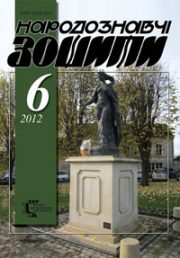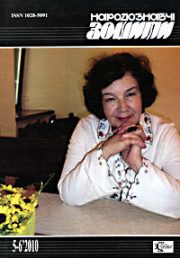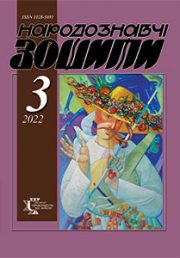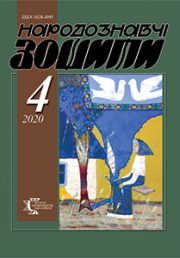The Ethnology Notebooks. 2025. № 3 (183), 689—701
UDK [39:061.2НТШ](477)”189/191″І.Франко:930.2
DOI https://doi.org/10.15407/nz2025.03.689
IVAN FRANKO — HEAD OF THE ETHNOGRAPHIC COMMISSION OF THE NTSH
SAPELYAK Oksana
- ORCID https://orcid.org/0000-0001-8111-6563
- PhD in History, Senior Research Associate,
- Institute of Ethnology of the National Academy
- of Sciences of Ukraine,
- Department of Modern Ethnology,
- Active Member of the Shevchenko Scientific Society,
- 15, Prospekt Svoboda, 79000, Lviv, Ukraine,
- Contacts: e-mail: etnomod@ukr.net
Abstract. Problem statement. In 1873, the Shevchenko Society (later the Shevchenko Scientific Society) was established in Lviv. It included scientific sections.
In 1898, at a meeting of the historical and philosophical section, M. Hrushevsky proposed electing an Ethnographic Commission, which was tasked with editing the «Ethnographic Collection», uniting scientists devoted to national interests, organizing scientific work and educating young ethnographers capable of keeping Ukrainian science in the know of universal interests and giving it an all-Ukrainian character as fully as possible. I. Franko was elected the chairman of this commission.
The purpose of the study is to study in more detail the direct contribution of the Chairman of the Ethnographic Commission in the process of collecting, recording ethnographic and folklore materials, organizing scientific expeditions, publishing and editing scientific research by ethnologists.
The object of the study is the activities of I. Franko as a scientist in the position of Head of the Ethnographic Commission of the National Scientific School, the subject is the scientific achievements of the commission from 1898 to 1914.
The methodological basis of the study is the general scientific principles of historicism, systematicity, scientific objectivity, which made it possible to carry out the necessary scientific analysis of the research topic as a whole, as well as its individual aspects, the use of various methods used by ethnological science, such as typological, complex, comparative and, importantly, the method of historical reconstruction of the phenomena under study.
Keywords: Ivan Franko, ethnology, Ethnographic Commission, recording of collected materials, expeditions, publications, reviews.
Received 24.05.2025
REFERENCES
- (1895). The program for collecting information about the Ukrainian-Rus region and people was compiled by members of the Shevchenko Scientific Society. Ethnographic collection (Vol. I, pp. 1—16). Lviv [in Ukrainian].
- Dykarev, M. (1900). The program for collecting information about communities and gatherings of rural youth (streets, evening parties, sodivki and skladki). Materials for Ukrainian-Rus ethnology (Vol. 3, pp. 1—27) [in Ukrainian].
- Kolessa, F. (1962). Review of the works of Prof. Zenon Kuzelia in the field of ethnography and ethnology. Notes of the National Scientific Society (Vol. I69, pp. 69—76). Paris; Munich [in Ukrainian].
- (1901). Full members of the Society. Chronicle of the National Scientific Society (Part 8, pp. 16—17) [in Ukrainian].
- Archives Institute of Art History, Folklore and Ethnography named after Maksym Rylsky (IMFE). F. 28. File 13; F. 28. Op. 1. File 18, 19, 13, 227; F. 29. Op. 1. File 21; Op. 3; File 280, Op. 2; File 33. Op. 3; File 181—182 [in Ukrainian].
- Franko, I., & Hnatyuk, V. (1904). To the collectors of ethnographic materials. Chronicle of the National School of Art (Part 20, pp. 14—17) [in Ukrainian].
- Franko, I. (1897). Review. Notes of the National School of Art. Bibliography (Vol. 21, pp. 38—40). Lviv [in Ukrainian].
- (1902, 1908, 1910). Meetings of commissions. Chronicle of the National School of Art (Part 12; Part 34; Part 43) [in Ukrainian].
- Central State Historical Archive in Lviv. F. 309. Op. 1. Unit. Collection 2266 [in Ukrainian].
- Kolessa, F. (1929). Foreword. Collection of works dedicated to the memory of Volodymyr Hnatiuk. Materials for ethnology and anthropology (Vol. 22, p. 15) Lviv [in Ukrainian].
- Arsenych, P. (2006). Places of life and activity of Ivan Franko in the Carpathian region. Who is who in Ivano-Frankivsk region. Modern history through the ages (Issue 3, pp. 17—36). Kyiv [in Ukrainian].
- Franko, I. (1884, July 24, 26). The Journey of the Ruthenian Youth. Dilo [in Ukrainian].
- Horak, R. (2005—2006). Early travels of Ivan Franko in Boykivshchyna in his works and epistolary. Ethnos i kultura (Pp. 5—15) [in Ukrainian].
- Gumenyuk, V. (2000). Who are you, Father Volyansky? Domashevsky M., Byblyuk N. History of Hutsulshchyna (Vol. 5, pp. 487—491).Lviv [in Ukrainian].
- (1900). Report on the ethnographic expedition. Chronicle of the National School of History (Part 4, pp. 18—19) [in Ukrainian].
- Vovk, F. (1908). Anthropological studies of the Ukrainian population of Galicia, Bukovina and Hungary. Materials for Ukrainian-Ruthenian ethnology (Vol. 10, pp. 1—67).Lviv [in Ukrainian].
- (1905). Report of the ethnographic commission of 1905. Chronicle of the National School of the Arts (Part 24) [in Ukrainian].
- (1904). Meetings of sections and commissions. Chronicle of the National School of the Arts (Part 19) [in Ukrainian].
- Rakovsky, I. (1929). Prehistoric motifs in Ukrainian folk art. Materials for ethnology and anthropology (Vol. 21—22, pp. 163—186). Lviv [in Ukrainian].
- Franko, I. (1985). Galician local history. Collected works: in 50 vol. (Vol. 46, book 2, pp. 116—150). Kyiv [in Ukrainian].
- Franko, I. (1985). Ethnographic exhibition in Ternopil. Collected works: in 50 vol. (Vol. 46, book 1, pp. 469—479. Kyiv [in Ukrainian].
- Franko, I. (1901). Preface to Volume I. Galician-Ruthenian Tales. Ethnographic Collection (Vol. 16, pp. 5—25). Lviv [in Ukrainian].
- Franko, I. (1898). Hutsul Sayings. Ethnographic Collection (Vol. 5, pp. 41—72). Lviv [in Ukrainian].
- Hnatiuk, V. (Ed.). (1902). Foreword. Galician-Ruthenian Legends. Ethnographic Collection (Vol. XII, pp. IX—XI). Lviv [in Ukrainian].
- Moroz, M. (1992). Ivan Franko’s Connections with the Austrian Ethnological Society. A Little-Known Review of Volodymyr Shukhevych’s Work «Hutsulshchyna». Notes of the National Scientific School. Proceedings of the Section of Ethnography and Folklore (Vol. 223, pp. 271—283). Lviv [in Ukrainian].
- Franko, I. (1899). Review. Notes of the National Scientific School. Section «Bibliography» (Vol. 27, book I, pp. P. 1—67) [in Ukrainian].
- Franko, I. (1955). Review of works on the ethnography of Galicia in the 19th century. In: Voznyak M. From the life and work of I. Franko. Selected articles on folk art (Pp. 244—267). Kyiv [in Ukrainian].
- Franko, I. (1898). Folk beliefs in Pidhiria in the village of Khodovychy, Stryi district. Written by F. Kolessa. Ethnographic collection (Vol. 5, pp. 160—218). Lviv [in Ukrainian].
- Franko, I. (1910). Foreword. Galician-Ruthenian proverbs. Ethnographic collection (Vol. 28, pp. 5—9). Lviv [in Ukrainian].
- Kuzela, Z. (1962). Ivan Franko as an ethnographer. Notes of the National Socialist School (Vol. 169, pp. 117—121). Paris; Munich [in Ukrainian].
- Franko, I. (1900). Foreword. Galician folk short stories by O. Rozdolsky. Ethnographic collection. (Vol. 8, pp. V—IX). Lviv [in Ukrainian].
- Franko, I. (1897). The Jewish War. A Contribution to Comparative Studies of Folk Literature. Wisla (Vol. VI, pp. 262—278). Warsaw [in Polish].
- Hnatiuk, V. (1903). Review. Notes of the National Socialist School. Bibliography (Vol. 51, book I, pp. 1—67). Lviv [in Ukrainian].
- Franko, I. (1897). Notes of the National School of the Arts. Bibliography (Vol. 18, book 4, pp. 1—67). Lviv [in Ukrainian].
- Franko, I. (1982). Zhitetsky. «Aeneid» by I.P. Kotlyarevsky and the oldest list of it. Collected works: in 50 vol. (Vol. 33, pp. 30—50). Kyiv [in Ukrainian].
- Franko, I. (1983). Life and literary activity of Ipatiy Potiy. Collected works: in 50 vol. (Vol. 39, pp. 508—533). Kyiv [in Ukrainian].
- Franko, I. (1983). History of Ukrainian literature. Part one. From the beginnings of Ukrainian writing to Ivan Kotlyarevsky. Collected works: in 50 vol. (Vol. 40, pp. 7—370). Kyiv [in Ukrainian].
- Franko, I. (1984). An essay on the history of Ukrainian-Russian literature until 1890. Collected works: in 50 vol. (Vol. 41, pp. 194—470). Kyiv [in Ukrainian].
- Poplavska, N. (2017). Ukrainian Polish-speaking polemicists of the late 16th — early 17th centuries in the literary concept of Ivan Franko. Polish Studies (Vol. XXIX, pp. 373—379). Kyiv [in Ukrainian].







